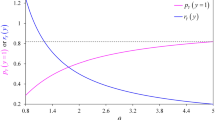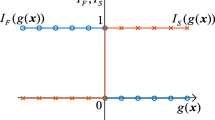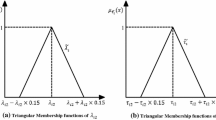Abstract
For some products, degradation mechanisms change during testing, and therefore, their degradation patterns vary at different points in time; these points are called change-points. Owing to the limitation of measurement costs, time intervals for degradation measurements are usually very long, and thus, the value of change-points cannot be determined. Conventionally, a certain degradation measurement is selected as the change-point in a two-phase degradation process. According to the tendency of the two-phase degradation process, the change-point is probably located in the interval between two neighboring degradation measurements, and it is a fuzzy variable. The imprecision of the change-point may lead to the incorrect product’s reliability evaluation results. In this paper, based on the fuzzy theory, a two-phase degradation model with a fuzzy change-point and a statistical analysis method are proposed. First, a two-phase Wiener degradation model is developed according to the membership function of the change-point. Second, the reliability evaluation is carried out using maximum likelihood estimation and a fuzzy simulation approach. Finally, the proposed methodology is verified via a case study. The results of the study show that the proposed methodology can achieve more believable reliability evaluation results compared with those of the conventional approach.
Similar content being viewed by others
References
YE Z S, XIE M. Stochastic modelling and analysis of degradation for highly reliable products [J]. Applied Stochastic Models in Business and Industry, 2015, 31(1): 16–32.
PAROISSIN C. Inference for the Wiener process with random initiation time [J]. IEEE Transactions on Reliability, 2016, 65(1): 147–157.
TSAI C C, LIN C T, BALAKRISHNAN N. Optimal design for accelerated-stress acceptance test based on Wiener process [J]. IEEE Transactions on Reliability, 2015, 64(2): 603–612.
ZHAI Q, YE Z S. RUL prediction of deteriorating products using an adaptive Wiener process model [J]. IEEE Transactions on Industrial Informatics, 2017, 13(6): 2911–2921.
RODRÍGUEZ-PICÓN L A, PERÉZ-DOMÍNGUEZ L, MEJIA J, et al. A deconvolution approach for degradation modeling with measurement error [J]. IEEE Access, 2019, 7: 143899–143911.
BAE S J, YUAN T, NING S, et al. A Bayesian approach to modeling two-phase degradation using change-point regression [J]. Reliability Engineering & System Safety, 2015, 134: 66–74.
BAE S J, YUAN T, KIM S J. Bayesian degradation modeling for reliability prediction of organic light-emitting diodes [J]. Journal of Computational Science, 2016, 17: 117–125.
YAN W A, SONG B W, DUAN G L, et al. Reliability evaluation of LCD based on two-phase Wiener degradation process [J]. Systems Engineering and Electronics, 2014, 36(9): 1882–1886 (in Chinese).
KONG D J, BALAKRISHNAN N, CUI L R. Two-phase degradation process model with abrupt jump at change point governed by Wiener process [J]. IEEE Transactions on Reliability, 2017, 66(4): 1345–1360.
ZHANG J X, HU C H, HE X, et al. A novel lifetime estimation method for two-phase degrading systems [J]. IEEE Transactions on Reliability, 2019, 68(2): 689–709.
WEN Y, WU J, DAS D, et al. Degradation modeling and RUL prediction using Wiener process subject to multiple change points and unit heterogeneity [J]. Reliability Engineering & System Safety, 2018, 176: 113–124.
JAVED K, GOURIVEAU R, ZERHOUNI N. A new multivariate approach for prognostics based on extreme learning machine and fuzzy clustering [J]. IEEE Transactions on Cybernetics, 2015, 45(12): 2626–2639.
PURBA J H, LU J, ZHANG G, et al. A fuzzy reliability assessment of basic events of fault trees through qualitative data processing [J]. Fuzzy Sets and Systems, 2014, 243: 50–69.
LIN Y H, LI Y F, ZIO E. Fuzzy reliability assessment of systems with multiple-dependent competing degradation processes [J]. IEEE Transactions on Fuzzy Systems, 2015, 23(5): 1428–1438.
GONZALEZ-GONZALEZ D S, PRAGA ALEJO R J, CANTÚ-SIFUENTES M, et al. A non-linear fuzzy regression for estimating reliability in a degradation process [J]. Applied Soft Computing, 2014, 16: 137–147.
GONZALEZ-GONZALEZ D S, PRAGA ALEJO R J, CANTÚ-SIFUENTES M. A non-linear fuzzy degradation model for estimating reliability of a polymeric coating [J]. Applied Mathematical Modelling, 2016, 40(2): 1387–1401.
LI X Y, WU J P, MA H G, et al. A random fuzzy accelerated degradation model and statistical analysis [J]. IEEE Transactions on Fuzzy Systems, 2018, 26(3): 1638–1650.
KHALIFA T R, EL-NAGAR A M, EL-BRAWANY M A, et al. A novel fuzzy Wiener-based nonlinear modelling for engineering applications [J]. ISA Transactions, 2020, 97: 130–142.
LEE M Y, HU C H, TANG J. A two-stage latent variable estimation procedure for time-censored accelerated degradation tests [J]. IEEE Transactions on Reliability, 2017, 66(4): 1266–1279.
WANG P, TANG Y, BAE S J, et al. Bayesian approach for two-phase degradation data based on change-point Wiener process with measurement errors [J]. IEEE Transactions on Reliability, 2018, 67(2): 688–700.
Author information
Authors and Affiliations
Corresponding author
Additional information
Foundation item: the National Natural Science Foundation of China (No. 61703391)
Rights and permissions
About this article
Cite this article
Liu, K., Dang, W., Zou, T. et al. Reliability Evaluation of Two-Phase Degradation Process with a Fuzzy Change-Point. J. Shanghai Jiaotong Univ. (Sci.) 27, 867–872 (2022). https://doi.org/10.1007/s12204-021-2323-3
Received:
Accepted:
Published:
Issue Date:
DOI: https://doi.org/10.1007/s12204-021-2323-3
Key words
- two-phase degradation
- Wiener process
- fuzzy change-point
- membership function
- reliability evaluation
- statistical analysis




